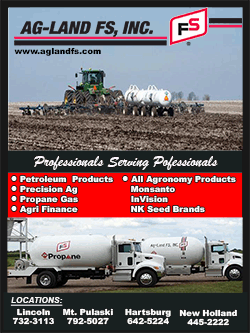|
Farmdoc Illinois Economic Summit: Farm management guide in difficult
times
 Send a link to a friend
Send a link to a friend
[November 18, 2020]
The past year has been a year like no other
for Illinois agriculture. While the year started optimistically with
talks of a surge in agricultural exports resulting from the trade
agreement with China, the COVID-19 pandemic rocked the global
economy. Most agricultural prices plummeted, and the government
created new ad hoc agricultural aid programs.
|
|
 Illinois farm managers for commercial and small-scale operations
are invited to the farmdoc 2020 Illinois Farm Economic Summit
for some perspective with research-based discussions of trends
and projections from University of Illinois experts. The summit
is being presented virtually with the first of five live
sessions starting December 1. College of Agricultural and
Consumer Economics experts and researchers will discuss where
the agriculture sector is heading and how to manage in such
unprecedented times. Illinois farm managers for commercial and small-scale operations
are invited to the farmdoc 2020 Illinois Farm Economic Summit
for some perspective with research-based discussions of trends
and projections from University of Illinois experts. The summit
is being presented virtually with the first of five live
sessions starting December 1. College of Agricultural and
Consumer Economics experts and researchers will discuss where
the agriculture sector is heading and how to manage in such
unprecedented times.
The online summit is free and will be presented 11 a.m. to noon
CT December 1, 4, 8, 11 and 15. Register in advance at
go.illinois.edu/IFES. Each session will include a 30-minute
presentation followed by a 30-minute Q&A.

2021 Market Outlook for Corn and Soybeans
December 1
In a year stricken by the coronavirus pandemic and an extremely
severe economic contraction, corn and soybean prices have risen
to levels that seemed impossible just a couple of months ago. A
critical question for 2021 is the likelihood of sustaining corn
prices near $4 and soybeans near $11. This webinar discusses the
2021 supply and demand outlook for corn and soybeans and the
longer-term outlook for trade with China.
Grain Farm Income Outlook with Risk and Rental Implications
December 4
Grain farm incomes in 2020 were supported by above-trend yields,
higher prices than expected, and several forms of Federal
payments. These 2020 incomes serve as a backdrop for 2021 income
projections. Sufficient 2021 incomes will be dependent on a
combination of above-trend yields and continued federal
payments. Risk management will be critical, and several new
tools are available this year.
Farm Program and Crop Insurance Decisions for 2021
December 8
The election and enrollment period for the ARC and PLC programs
for the 2021 crop year is now open, and decisions must be made
by March 15. A new county-based crop insurance program, the
Enhanced Coverage Option (ECO), will also be available for crops
produced throughout the Midwest. ECO can be used to supplement
underlying multi-peril coverage for eligible crops. This session
will address these decisions and provide some examples and
recommendations for Illinois farm situations.
[to top of second column] |

Post-election Farm Policy Outlook
December 11
We consider the short- and medium-run outlook for U.S. farm
policy following the 2020 election. The presenters will provide
an updated review of three years and four rounds of ad hoc farm
payments, including an analysis of payment distribution and
program design for the Market Facilitation Program (MFP) and
Coronavirus Food Assistance Programs (CFAP). Presenters will
discuss what the perceived need for ad hoc assistance says about
standing farm programs such as Agricultural Risk Coverage (ARC)
and Price Loss Coverage (PLC) and the implications for future
coronavirus-related relief and the 2023 Farm Bill.
Farmland Markets and Macro Markets
December 15
Farmland is receiving significantly increased attention by
owners and investors seeking to make sense out of the scrambled
economic signals of the recent past. This session examines the
relative returns to farmland over differing macro-environment
periods of the past and suggests the strength of relationship to
expect in the future to financial assets, interest rate indexes,
and inflation.
University of Illinois Extension provides equal opportunities in
programs and employment. If you need reasonable accommodation to
participate in this program, please contact Ryan Batts at
batts@illinois.edu.
Early requests are strongly encouraged to allow sufficient time
for meeting access needs.
[WRITER: Emily Steele, Media
Communications Coordinator, Illinois Extension]

 |